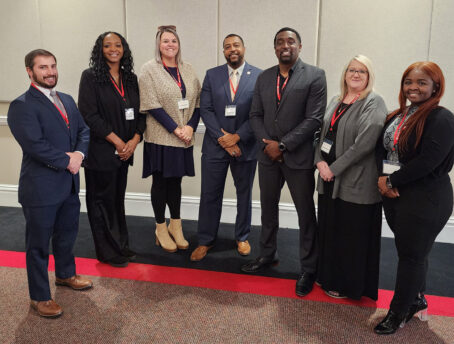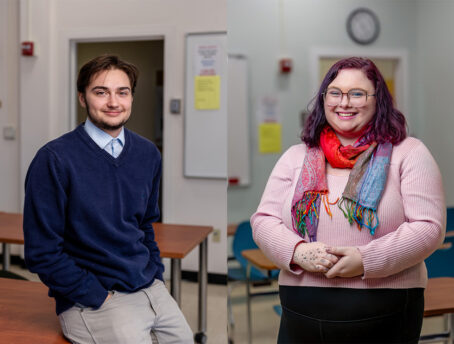Listen to the podcast here:
You can also find our podcast on Apple Podcasts, Google Podcasts and Spotify.
Written version:
Hello, and welcome to the I Am A Rural Teacher Podcast, a project of Rural Schools Collaborative and the National Rural Education Association. Rural teachers are the heartbeats of their community, encouraging students to do their best and supporting programs in their schools. Brian Skinner is a high school special education teacher from Newton, Kansas, who was named a 2023 Kansas Teacher of the Year for his outstanding work with his students.
This story is especially near-and-dear to Rural Schools Collaborative Executive Director, Taylor McCabe-Juhnke. Taylor first met Brian when they were in the same class at Bethel College, in North Newton, Kansas, and Brian now teaches at Taylor’s hometown high school alma mater, Newton High School.

Brian is now in his tenth year of teaching, and he always knew he wanted to be a teacher. When he went to college, he found his passion for special education through his classes:
“Pretty early on at Bethel College I decided that I wanted to be a teacher, and I was always set on being a history teacher. And through part of the process of education, at one point I had to do a course where I worked with youth, children, infants with special needs, and I'm not sure exactly what it was still about that first observation I did, but I do know about a week later I went down and I added the emphasis of special education. Something about helping that population of students has just really clicked for me. Part of my philosophy for education is that I want to specifically be helping those students that would struggle to find success if a teacher wasn't there and being able to help eliminate some of those stigmas and help students find their best success really has been a passion of mine, so that's why I'm doing what I'm doing.”
Brian also knew he wanted to go back and teach in a rural community:
“I grew up in Clay Center, even a little bit smaller than where Newton is, and I lived on a farm. Farming and just kind of that rural lifestyle has always been a part of my life, so I knew as I was looking at colleges and places where I wanted to settle that a big city somewhere wasn't going to fit kind of the style that I enjoyed, and with that style comes just this close-knit community, and I think that's one of the huge positives that where I grew up with rural is, and where Newton is, and those are areas where I thrive in because they align with my beliefs.”
He goes on to explain how a smaller student body gives teachers the opportunity to cater programs to their students’ needs and interests, making them feel more connected to their community:
“The unique thing about rural schools is that we're able to tailor them more to our communities that we've got. So we're able to take all of our core content with our social studies, our science, our English, our math, and gear it through the lens of agriculture, and that directly then impacts the students that are obviously going to stay in our community, they're going to stay in a rural lifestyle, and they've been able to learn the skills they need to be successful through a lens that is most applicable to them. And you can't get that as well if you're in the urban setting. And I've seen those pieces all throughout the state, so we have the same opportunities, we can just tailor them to fit our needs better.”

Along those lines, Brian shared that his favorite part of teaching is seeing those students return to the community:
“I am fortunate that I get to work with students in their last leg of their of their K-12 schooling, and the memories that stand out most are when students choose to come back and want to have lunch with Mr. Skinner, or when they start a haircutting business, they're like ‘Hey can I be your barber?” Those things where they don't have to engage with me after that, but the fact that they choose to and they choose to do that on their own time, I think is something that resonates because it shows some of that impact that I had, and it's just special to keep those connections going.”
Another reason students feel that connection and want to re-integrate is due to really involved community players supporting the school:
“We have a lot of really strong community partners in Newton, which is great. It helps with any kind of events we're trying to sponsor to highlight students or to highlight teachers and it comes into play in so many other areas. One specific area that I see the community coming in as part of the Project Search that I work with. At Project Search we serve 18 to 21 year olds who have finished their academic programming, and we have a partnership with NMC Health, and with that partnership they spend all year working with the community, with NMC Health, and building those vocational skills so that they can stay within the community, have career jobs, work an independent living. And I think programs like that just highlight the support that Newton has for its schooling and that the schools has for its community at large.”
Brian explains that, despite some portrayals of small towns, there is always something happening in Newton, and so many community activities revolve around the students and the schools:
“If someone were strolling down the street, they would see a lot of action. A lot of things happen. Newton's a place where there is always something happening. Just yesterday, because we finished school, we had our STAND group that came in, that supports mental health, that was serving donuts to the students; a few days before that we had a senior night celebration; before that we had just pockets of groups that are getting together before school to bond with each other and groups that are spending time after school to bond together. I feel like there are always activities that are happening at our building, there’s always activity happening in our community, and the commonality piece is they all involve our youth and our school system and the future of our community.”
We asked Brian more about what it was like to become a Kansas Teacher of the Year, and he explained more about how he received the honor:
“The process to be Kansas Teacher of the Year was a pretty intensive and very lengthy process. I was nominated by my administration back in October of 2021, which seemed like forever away, and so each of the 286 school districts in Kansas gets to nominate one secondary, one elementary, and then there's a lengthy process of filling out pieces that narrow it down to semi-finalists, finalists, some interviews, and then in September of 2022 I was named at a banquet the Kansas Teacher of the Year along with - I have seven other finalists that I get to tour around the state with and just highlight the great things public education is doing.”
Brian shared that he has learned a lot during his time as a Kansas Teacher of the Year, and shared the following reflections based on his newly broadened perspective:
“Education is what we make it, the emphasis on the we, the collaborative, the community piece. We've done a lot of things just to re-spark the joy in the profession. The education profession is tough, but so is every job, and one of the things that makes the education profession different, unique, and in my opinion better, is the ability to make those connections. To be able to impact someone's future, to be able to help them see where they're going. We need to celebrate all the amazing things that are happening in public schools because there are so many great things happening, and when we make that the narrative, when we focus on the impacts we have and just those things that make you smile at the end of your day, that's what keeps me going, that's what fills my cup, that's what reminds me that we can bring more people in and highlight their strengths and build the society we want to live in.”

He also wanted to offer the following encouragement and advice to those considering the teaching profession, particularly those interested in special education:
“At the end of the day it all loops back to helping kids. As you look at the makeup of students, everyone has different needs across the board, whether they're a special education student, whether they are an honors student, whether a student that is focusing on their extracurriculars. And focusing on that human piece and showing that you care is that first avenue to being able to unlock how you work with kids. And then taking the time to recognize kids as individuals and learn about how they struggle with reading comprehension or social skills or writing - those are ways that you're able to then look at strategies to be able to help individuals, and it's not as intimidating as it seems because you're able to work closely with someone else and that's the highlight of what I do as a teacher.”
Brian also wanted to offer some words to community members who want to help support rural teachers and rural schools:
“Schools are always looking for volunteers to be able to help out. The more that we're able to bring the community in, this is a team effort. I mean, you've got that phrase: it takes a village. It absolutely does, it takes a village, it takes a community, to be able to raise a child. You can have an impact by putting resources towards our schools, by putting your time in, by finding passions, spending a one day volunteer, and the more you do that, the more kids and teachers see how much the community supports them, and when kids feel supported, when teachers feel supported, they're more likely to be invested in what they do, they're more likely to stay in the community and just have a positive outlook.”
Brian left us with these final thoughts about rural schools and his experiences as an educator:
“Public schools are doing really great things. The aspiring Educators that are coming up through education prep programs and the colleges around the state are really equipped to help students best. I've been able to see just so much care and love for the communities that everyone is a part of, I've been able to work with seven other amazing educators that just have passion for kids, and when I see those pockets from all different parts of the state, it helps remind me that what we're doing matters, and we don’t always feel like what we do is enough, but it is.”
Thank you for engaging with this episode of the I Am A Rural Teacher Podcast. We’d like to thank our partners at Kansas State University for leading the Rural Schools Collaborative Kansas Regional Hub, where Brian is based. Special thanks to Brian for sharing his story, and congratulations again on being a Kansas Rural Teacher of the Year. The I Am A Rural Teacher Project is a collaborative project with the National Rural Education Association.





